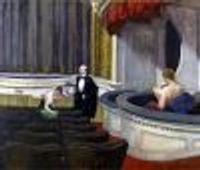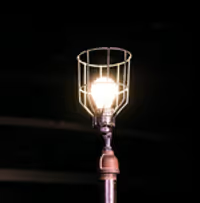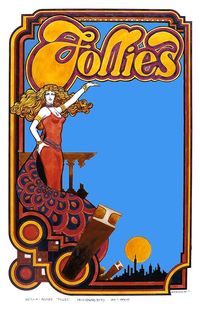They've dropped the "Kowalski" from Stanley's name in new Streetcar revival
nasty_khakis
Broadway Legend Joined: 3/15/07
#100A middle aged streetcar
Posted: 4/4/12 at 12:11pm
MB, I thought that as well. She may have found evidence of a Black family-owned plantation being sold then or somesuch. I also thought about where this cast is older and it may be to create more distance between the war to the present. Stanley served ten years ago verses two years ago. Small change, but acknowledges their older ages.
I agree about the light scene, but can't come up with staging or performance solutions without vering into melodrama territory. In many ways, to me at least, this moment is more damning to Blanche's psyche and health than her actual rape later. It really pained me to see it laughed at. I did love the use of the overly bright light bulb to shock, but the line about her being older than I thought got a GUT laugh.
henrick- I've read articles about it but they're generally pretty weak and tend to blame things like racial minorities rarely go to live theatre except to see their own race and when they do they're not experienced enough to know better. I think it's more complex than that because it happens at movie theatres as well. Granted I can name many a time when lily white teenage girls talked on phones all through a movie as well.
#101A middle aged streetcar
Posted: 4/4/12 at 2:45pm
Thanks, Nasty, I think it's a very challenging topic and one which merits some serious attention.
Theater-going mores differ from community to community, genre within national traditions (e.g., Gaveston has graced us with his extensive scholarship on the differences between noh and kabuki audiences), and over time - compare the rowdy Elizabethan audience to the generally staid Victorian one.
We might begin to ask ourselves if the way people once dressed and acted attending the American commercial theater might be on the verge of becoming passe - in some respects, the unofficial dress code, it no doubt became obsolete long ago. And what might be arguably lost and what arguably gained from the anticipated changes. A socially relativistic perspective can't be dismissed.
On the other hand, neither should an interest in not being unduly distracted when one attends the theater be dismissed as an insignificant concern. In addition to what are considered inappropriate or inorthodox audience verbalizations, we've also seen very strong opinions on bww on topics ranging from sippy cups to entrance applause to kickline applause to cellphones - and some of these arguable distractions, not unreasonably complained of, such as entrance applause, are traditional practices in the American commercial theater.
What irks me is impolite and dehumanizing commentary directed at particular theater-going communities, be they defined ethnically, sexually, etc. It's one thing to call attention to particular behavior and identify it as coming from a particular community. In fact it's interesting, worthy of discussion, and shouldn't be repressed.
It's another for it to be ugly and or mean-spirited. Complaints such as mine can easily be offset as cliche or knee-jerk "p.c." rhetoric. But they are simply a call for common courtesy, empathy, intelligence, and humility; as well as an expression of distaste when confronted with hatefulness, arrogance and or hubris.
It is not my intention to repress or censor (not that I presume to have that kind of authority) this ugliness but merely to call it what it is when I encounter it.
On another but related note, all this talk of the Streetcar audience got me thinking about my recent, and in some ways converse experience, attending Hurt Village. Because the play was presented in the round, I felt uncomfortable constantly being reminded that the audience was largely white, obviously well-heeled, mature, staid (not to imply the work was not generally well received by a great many attending fitting this profile, perhaps the majority of whom seemed to appreciate Hall's play), who seemed to be encountering a complete other world. I'd be lying if I didn't feel a measure of additional discomfiture watching this play because my view of the action included an audience that mirrored myself, and reinforced the racial American divide.
The reserved quality of the Hurt Village audience, the all but complete demographic contrast of the audience to the company, and, more to the point, my awareness of others in the audience (resulting from the in-the-round presentation) became, similar to the experience being described in threads about Streetcar and Evita, a part of the experience of seeing the play to a far greater extent than what communal audience energy usually imparts to the theater-goer.
Updated On: 4/4/12 at 02:45 PM
#102A middle aged streetcar
Posted: 4/4/12 at 3:22pm
One reason the light moment isn't working is that Mitch isn't being aggressive enough with her. The moment is traditionally staged with Mitch essentially throwing Blanche under the lamp and forcing her face up to the light; its scary and sad and perhaps all too inevitable that ultimately Mitch, who Blanche has come to see as a kind of kindred spirit, would in the end prove no better a man than Stanley. That's what we/and she feel as gut wrenching in that moment.
I mean it as a compliment when I saw that Wood Harris's portrayal of Mitch is one of the most likable takes I've seen of the character. It's a very good performance, but as is currently staged, there isn't much power in his actions. The audience clearly isn't sensing that the character has 'flipped' in his rage over discovering the truth about Blanche. Harris needs to be more aggressive in the scene, and it should be re-directed so that he's actually forcing her (exposing her) to the truth.
Gaveston2
Broadway Legend Joined: 6/28/11
#103A middle aged streetcar
Posted: 4/4/12 at 4:14pm
I was merely highlighting what I hold to be - as it happens, your post seems to suggest we concur - at the heart of the play in order to put all other matters herein discussed in their proper and relative - albeit by no means insignificant - perspective.
Fair enough, henrik. I think we do agree about the basic conflict of the play and I readily admit it is possible to be moved by that family rift while completely ignoring the historical context. I just think that gay culture and feminism have turned Blanche and Stella into such icons of gender (both positive and negative) that the play borders on unintentional camp.
As someone who loves the genre of Southern literature, I hate to see Williams' plays lose their moorings. (I, too, saw a production that became a broad comedy and was horrified: Ellen Geer played Blanche in LA when she was nearing 60. The age disparity made Blanche seem like a crazy bag lady and I assumed that was what provoked the misplaced laughter.)
***
As for writers addressing specific audiences and their behaviors (I assume that's what you meant above), I have read some who see African-American theatergoing behavior as rooted in the call-and-response of traditional African theater and passed down through the participatory nature of black Pentecostal churches. The theory makes sense to me, but this isn't my field and the pieces I've read on the subject came from academic journals. I'm sorry it's been too long to point you to a specific scholar.
But as for theater audience behavior in general, I suspect but can't prove that the dominance of musical spectacles, amped up to 11 and automated to the hilt, has taught audiences that what they do or don't do really doesn't affect the performers or those around them. (The concurrent advent of Dolby sound, etc., in movie theaters hasn't helped.)
***
But back to STREETCAR: I loved, but was surprised by the silhouette of the poster; it makes more sense if the play is now set in 1953. Skirts didn't flair like that until the textile industries were restored in the years after the war, making material available for dresses again (instead of uniforms, tents, parachutes, etc.).
I'm just guessing, but moving the play to 1953 might have to do with the ages of the cast. Stanley was a vet in WWII, in which men were drafted from ages 18 to 38. So a late 30s/early 40s Stanley might have been possible in 1947, but would be more likely a few years later.
#104A middle aged streetcar
Posted: 4/4/12 at 5:01pm
Apparently audience tardiness is also an issue. Just received this email from TDF:
"Important notice: Your tickets for STREETCAR will be ready for pick up at 4PM on the day of the performance and the Broadhurst Theatre box office is requesting that you pick your tickets up as early as possible lest the curtain be delayed! Many thanks for your cooperation. Enjoy the show!"
No comment.
#106A middle aged streetcar
Posted: 4/4/12 at 5:34pmThe TDF notice continues... "All candy must be unwrapped in advance, and please de-bone your fried chicken before taking your seat."
BroadwayMan5
Chorus Member Joined: 3/31/12
#108A middle aged streetcar
Posted: 4/4/12 at 6:18pm
The worst instance of inappropriate audience reaction I've witnessed was at the Taper here in Los Angeles while attending THE GOAT or WHO IS SYLVIA?.
The show starts out funny / witty but moves to grave and downright tragic. Many in the audience simply didn't understand the transition in the material -- it wasn't the performances. They just weren't used to this kind of material and, sadly, probably not bright enough to distinguish between the word 'goatfuc*er' when being used for comedic purposes and the same word being used to evoke betrayal and a shattered sense of love.
I was horribly annoyed during the show, but later tried to adopt a different assessment of the problem. "At least they saw it," I thought. Maybe it would make them curious to see more theatre.
#109A middle aged streetcar
Posted: 4/4/12 at 6:26pmDo you remember what they were eating at the time?
#110A middle aged streetcar
Posted: 4/4/12 at 7:38pmHad my glares been edible, they'd have been stuffed silly.
#111A middle aged streetcar
Posted: 4/4/12 at 8:53pm
This is one of my favorite plays of all time so I went to the matinee today, I really couldn't wait. I think while this is at times a flawed production, it's pros more than outweigh it's cons. First, Parker is PHENOMENAL. I mean, I've always been a fan of hers and I don't know what I was expecting but she really just blew me away for a second preview. I think it's one of the hardest roles in all of theater to play and she pretty much nailed it. Of course there's things she'll grow into and discover as time goes on and I really can't wait to see it again down the line to see her again. Daphne is superb as well (as always) and didn't miss a beat the entire show.
Watching this today, I thought that Underwood still needed to discover who Stanley really was because he really just plays him to be mean most of the time. But after talking to the director after the show about "The Scene" at the end which was done so brutally, I asked her "Why did you make the decision..." and she stopped me and said "Because Blanche was raped and I wanted there to be NO doubt about that". So I guess his Stanley is just a mean, sadistic MoFo.
The only really negative thing about the production I can say is Wood Harris. His acting is painful. It's like watching a community theater's understudy's standby go on. I mean, if there was ever an actor who should take some classes, it's him. Is it too late to get someone else? Anyone else would do. Randy Jackson would be better.
Other than that, like other people said - I didn't realize this was such a comedy! I felt so stupid for not getting all of the humor all these years. And when I saw Blanchett, I should have yelled out "WHORE!" to her in Act 2 like someone did today. And in case you didn't know, when Stanley attacks Stella THAT. IS. SOME. FUNNY. SH*T. (I mean, that's what the guy in front of me yelled). The woman in back of me was too busy going through her purse for more candy bars to really notice I think, but had she been watching the stage instead of her Baby Ruths, I just know she would have LOL'd, too. Funnily enough, when I was seated I was seated right next to a HUGE group of high school students and you know no matter WHAT show you go to, that just means trouble. But if any of them are reading this, you guys ROCK! I've never in my life seen such a great group of kids at any show. Too bad people around you couldn't take your lead.
But all in all I really do recommend going to see this. In a couple weeks it's going to be even better, I think and Parker is a DEFINITE contender for that Tony this year.
Updated On: 4/4/12 at 08:53 PM
#112A middle aged streetcar
Posted: 4/4/12 at 9:07pmI honestly thought Daphne would be playing Blanche and Nicole would be playing Stella. I'm surprised at the casting. Im glad to hear Parker is great.
Dollypop
Broadway Legend Joined: 5/15/03
#113A middle aged streetcar
Posted: 4/4/12 at 9:31pm
Re: The kids in the audience
When I was teaching, STREETCAR was an extremely popular part of my curriculum. No matter what group of kids I had in that class, they responded to the play on different levels. It took a bit of prodding, but the kids eventually caught on to the color symbolism in the play and wrote decent--and in some cases--perceptive essays about it on the state Regents exams (Although there was the one kid who wrote about something called A STREET CARNATION DESIRE and another who thought the author was Mississippi Williams).
It doesn't surprise me that young people behaved properly during this production. There's something about it that truly engages kids.
#114A middle aged streetcar
Posted: 4/4/12 at 9:40pm
Dollypop! You don't remember Mississippi Williams??? Among his most well-known works are The Night of the Aardvark and Poodle on a Hot Plate.
#115A middle aged streetcar
Posted: 4/4/12 at 9:42pmMississippi Williams sounds like an aging playwright who would make an appearance on THE SIMPSONS.
Dollypop
Broadway Legend Joined: 5/15/03
#116A middle aged streetcar
Posted: 4/4/12 at 9:43pmLest we not forget: The Glass Menage a Trois!
Dollypop
Broadway Legend Joined: 5/15/03
#117A middle aged streetcar
Posted: 4/4/12 at 9:46pm
I could probably write a book about the literature essays I read (and graded) in 36 years of teaching.
Now, however, back to the STREETCAR discussion. I'm finding it very illuminating.
#118A middle aged streetcar
Posted: 4/4/12 at 9:53pmGoodie, the beasts are back. Didn't Mississippi write SUMMER AND SMOKY?
Dollypop
Broadway Legend Joined: 5/15/03
#119A middle aged streetcar
Posted: 4/4/12 at 9:58pm...and The Roman Spring of Mrs. Stoned
#120A middle aged streetcar
Posted: 4/4/12 at 10:00pmI love BABY DULL.
#122A middle aged streetcar
Posted: 4/4/12 at 10:07pmI'll never remember Liz and Dick in BOMB! It was absolutely unrememberable.
Dollypop
Broadway Legend Joined: 5/15/03
#123A middle aged streetcar
Posted: 4/4/12 at 10:13pmI was always partial to "Eccentricities of a Bloomingdale"
#124A middle aged streetcar
Posted: 4/4/12 at 10:14pmI actually thought Wood Harris was surprisingly strong at the final dress- I'm surprised to read your comment- I wonder if his performance has unraveled with the audience reaction being what it's been.
Videos








